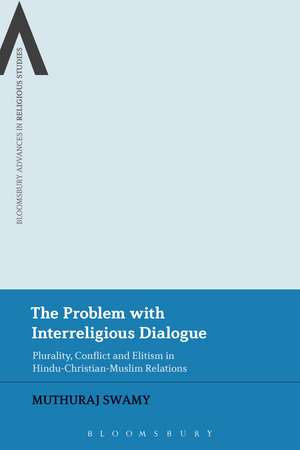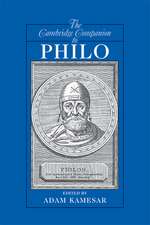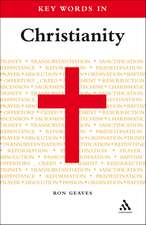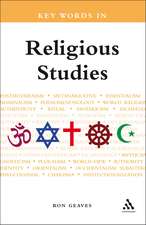The Problem with Interreligious Dialogue: Plurality, Conflict and Elitism in Hindu-Christian-Muslim Relations: Bloomsbury Advances in Religious Studies
Autor Dr Muthuraj Swamyen Limba Engleză Paperback – 20 sep 2017
| Toate formatele și edițiile | Preț | Express |
|---|---|---|
| Paperback (1) | 237.57 lei 43-57 zile | |
| Bloomsbury Publishing – 20 sep 2017 | 237.57 lei 43-57 zile | |
| Hardback (1) | 773.39 lei 43-57 zile | |
| Bloomsbury Publishing – 23 mar 2016 | 773.39 lei 43-57 zile |
Din seria Bloomsbury Advances in Religious Studies
- 24%
 Preț: 196.71 lei
Preț: 196.71 lei - 23%
 Preț: 191.22 lei
Preț: 191.22 lei - 23%
 Preț: 192.10 lei
Preț: 192.10 lei - 13%
 Preț: 256.20 lei
Preț: 256.20 lei - 13%
 Preț: 256.59 lei
Preț: 256.59 lei - 13%
 Preț: 257.97 lei
Preț: 257.97 lei - 13%
 Preț: 237.28 lei
Preț: 237.28 lei -
 Preț: 256.59 lei
Preț: 256.59 lei - 13%
 Preț: 257.68 lei
Preț: 257.68 lei - 13%
 Preț: 258.77 lei
Preț: 258.77 lei - 23%
 Preț: 198.30 lei
Preț: 198.30 lei - 23%
 Preț: 198.47 lei
Preț: 198.47 lei - 23%
 Preț: 191.67 lei
Preț: 191.67 lei - 23%
 Preț: 196.96 lei
Preț: 196.96 lei - 24%
 Preț: 196.71 lei
Preț: 196.71 lei -
 Preț: 192.48 lei
Preț: 192.48 lei - 23%
 Preț: 192.19 lei
Preț: 192.19 lei - 23%
 Preț: 192.36 lei
Preț: 192.36 lei - 23%
 Preț: 191.38 lei
Preț: 191.38 lei - 23%
 Preț: 192.73 lei
Preț: 192.73 lei - 23%
 Preț: 191.92 lei
Preț: 191.92 lei
Preț: 237.57 lei
Preț vechi: 272.69 lei
-13% Nou
Puncte Express: 356
Preț estimativ în valută:
45.47€ • 49.41$ • 38.22£
45.47€ • 49.41$ • 38.22£
Carte tipărită la comandă
Livrare economică 21 aprilie-05 mai
Preluare comenzi: 021 569.72.76
Specificații
ISBN-13: 9781350048591
ISBN-10: 1350048593
Pagini: 248
Greutate: 0.35 kg
Ediția:NIPPOD
Editura: Bloomsbury Publishing
Colecția Bloomsbury Academic
Seria Bloomsbury Advances in Religious Studies
Locul publicării:London, United Kingdom
ISBN-10: 1350048593
Pagini: 248
Greutate: 0.35 kg
Ediția:NIPPOD
Editura: Bloomsbury Publishing
Colecția Bloomsbury Academic
Seria Bloomsbury Advances in Religious Studies
Locul publicării:London, United Kingdom
Caracteristici
Argues that the concept of interreligious dialogue is flawed since it relies on the problematic world religions paradigm, in which religions are neatly defined
Notă biografică
Muthuraj Swamy is Assistant Professor and Head of the Department of Christian Theology & Ethics in the Union Biblical Seminary (Serampore University), Pune, India. He is the author of Christian Relations to Other Religions: Issues and Interpretations (2015) and Religion-State Relations in Early Christianity and Hindu Nationalism: A Contemporary Appraisal of St. Ambrose of Milan (2015).
Cuprins
Introduction Part 1: The Problem: The Concept and Practice of Dialogue1. Dialogue in Post-Colonial India: A Brief Survey2. The Practice of Dialogue: A Case from Kanyakumari District Part 2: Limitations of Religious Plurality, Conflict and Elitism3. 'Religion' and 'World Religions': Some Contemporary Approaches4. Religious Plurality and Dialogue5. Are Religions in Conflict?6. Dialogue and the Myth of Religious Conflicts: A Case Study 7. Dialogue as Elitist Part 3: Multiple Identities as a Challenger 8. Religion, Multiple Identities and Everyday Relations among Ordinary People9. After Dialogue ConclusionBibliographyIndex
Recenzii
In a style that is accessible, yet not reductionist, Swamy has successfully shown that most conflicts termed "religious" are anything but that.This work encourages academics and social scientists to undertake similar researches in other areas of religious studies, where many centuries-old constructs have been blindly followed.
A well-grounded study that raises important questions for the future of interreligious dialogue . I warmly recommend the book for those interested in interreligious dialogue, as well as interreligious relations and lived religion in India.
A detailed and thorough critique . Swamy's writing style is clear and his overall argument diligently signposted throughout . The book is a salutary and provocative addition to the literature concerning interreligious dialogue, and a good read for those interested in the politics of religion in India (and elsewhere) in all its discursive messiness.
Stripping away the overgrowth and debris that hid the inherent promise and ongoing potential of interreligious dialogue, and carefully, creatively, provocatively yet committedly using case studies and displaying mastery over a huge amount of literature, the author reopens and interrogates the meaning, limitations, and potential of dialogue in our messy 21st century. Just when one thinks that certain influential ideas and movements have run their course and reached an impasse, mainly because of faulty starting-points and overly simplistic assumptions about that catch-all word "religion", this is a book which skillfully forces us to confront our suppositions and reboot our commitments.
A well-grounded study that raises important questions for the future of interreligious dialogue . I warmly recommend the book for those interested in interreligious dialogue, as well as interreligious relations and lived religion in India.
A detailed and thorough critique . Swamy's writing style is clear and his overall argument diligently signposted throughout . The book is a salutary and provocative addition to the literature concerning interreligious dialogue, and a good read for those interested in the politics of religion in India (and elsewhere) in all its discursive messiness.
Stripping away the overgrowth and debris that hid the inherent promise and ongoing potential of interreligious dialogue, and carefully, creatively, provocatively yet committedly using case studies and displaying mastery over a huge amount of literature, the author reopens and interrogates the meaning, limitations, and potential of dialogue in our messy 21st century. Just when one thinks that certain influential ideas and movements have run their course and reached an impasse, mainly because of faulty starting-points and overly simplistic assumptions about that catch-all word "religion", this is a book which skillfully forces us to confront our suppositions and reboot our commitments.















